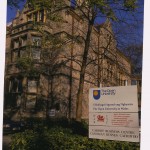Who attends university?
Monday, July 11th, 2011 At the opening of the OU in 1969 the new Chancellor spoke of it being open to everybody, regardless of qualifications. This disrupted the assumption that only those with suitable formal qualifications were suitable for higher education. It reflected the OU’s culture as emerging from part-time adult education, correspondence courses and Univerisity Extension in the nineteenth century, as well as in the post-war expansion of HE. It now appears that other universities operate a system of entry not simply based on formal assessment. However, these universities have not adopted the ethos of openness espoused by the OU. Research by the Sutton Trust (a charity) suggests that five schools send more students to Oxbridge than 2,000 other schools. There was a report on this by the BBC. In terms of its historical committment to being open the OU remains distinctive.
At the opening of the OU in 1969 the new Chancellor spoke of it being open to everybody, regardless of qualifications. This disrupted the assumption that only those with suitable formal qualifications were suitable for higher education. It reflected the OU’s culture as emerging from part-time adult education, correspondence courses and Univerisity Extension in the nineteenth century, as well as in the post-war expansion of HE. It now appears that other universities operate a system of entry not simply based on formal assessment. However, these universities have not adopted the ethos of openness espoused by the OU. Research by the Sutton Trust (a charity) suggests that five schools send more students to Oxbridge than 2,000 other schools. There was a report on this by the BBC. In terms of its historical committment to being open the OU remains distinctive.



